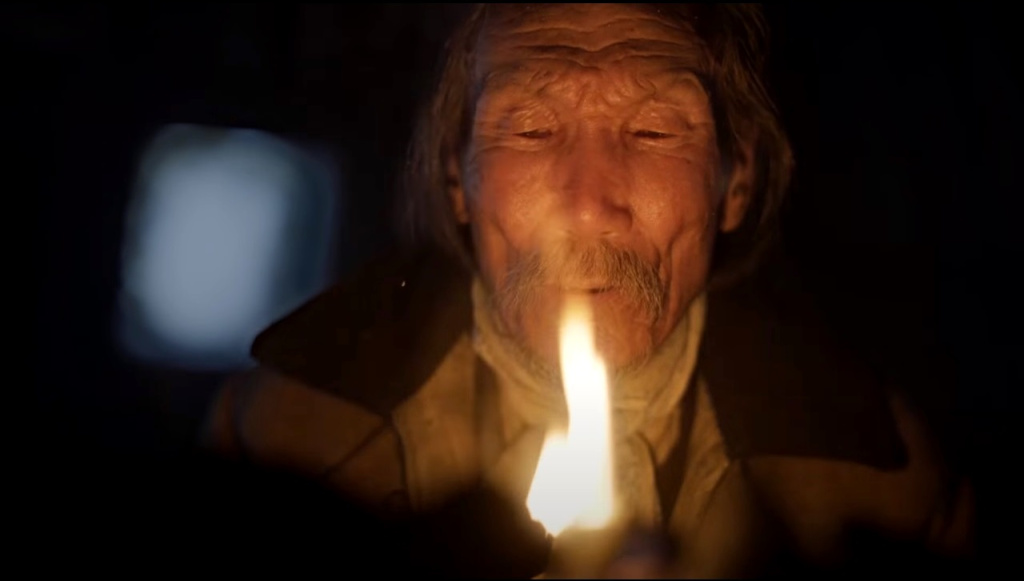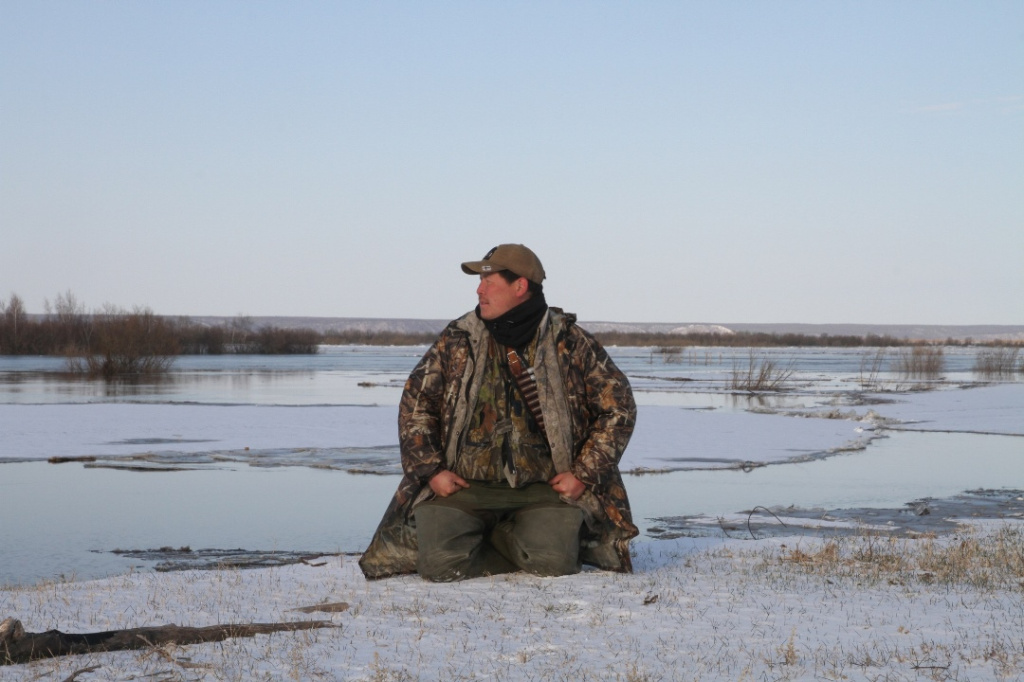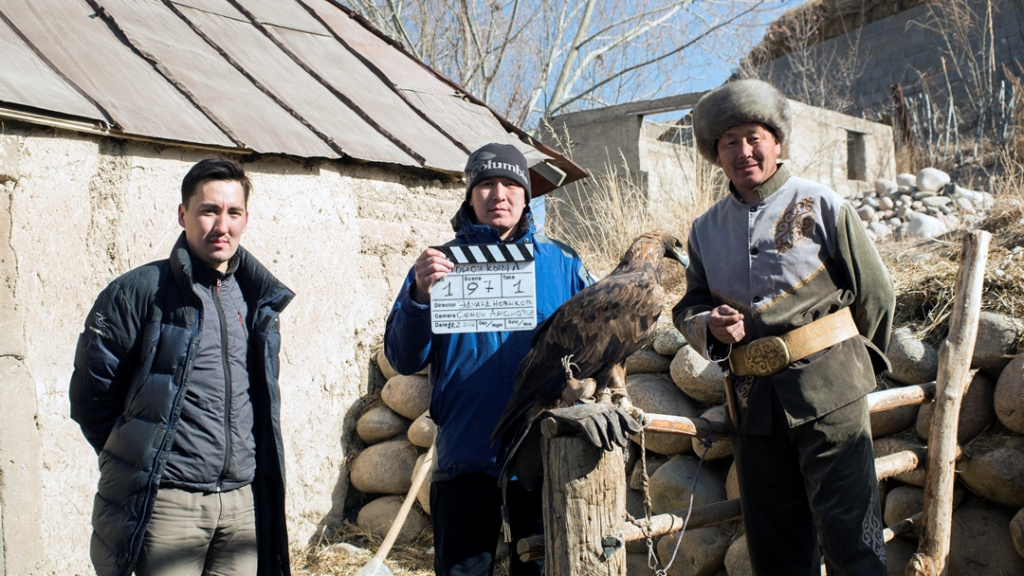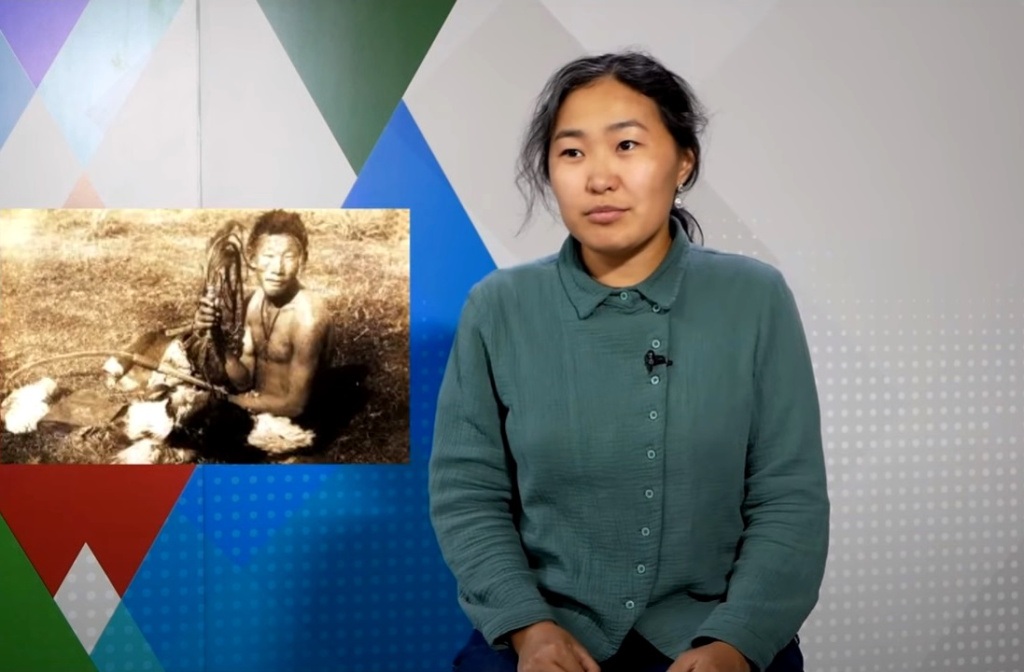
"Films are shot even in the villages": Myths and Reality of Yakut Cinema
/ Главная / Russkiy Mir Foundation / Publications / "Films are shot even in the villages": Myths and Reality of Yakut Cinema"Films are shot even in the villages": Myths and Reality of Yakut Cinema

The image from The Lord Eagle (directed by Eduard Novikov)
During the last decade, Yakut cinematography has evolved into a special phenomenon in the Russian and world cinema industry. Films about local people made by Yakut directors in their native land participate in major international festivals (in Cannes, Berlin, etc.), as well as domestic film shows, and receive awards. This year the Yakut documentary "Exit" was nominated for the Academy Award in the short film category.
"The phenomenon of Yakut cinematography is in the fact that we make films on the Yakut land for the Yakut audience," one of the filmmakers told the Russkiy Mir. "International success is a pleasant bonus.” Thirteen films by local filmmakers were released on the big screens in Yakutia last year. They all sparked the interest of the audience.
The Russkiy Mir reached out to several Yakut filmmakers. According to them, they feel like the successors of the ancient storytellers of the national epic. They used to go from settlement to settlement retelling the myths about their ancestors' deeds. No wonder most filmmakers, even those who have achieved international success, continue to live in Yakutia and keep the connection with their fellow countrymen and see this as the primary source of their work.
Interesting and truthful movie
When we called Stepan Burnashev, he was in St. Petersburg. He had come there to present his latest film, Aita. There is a big tour through Russia ahead: St. Petersburg, Moscow, Yekaterinburg, Novosibirsk, and Yakutsk. The film is a drama with detective elements based on the Yakut materials. Aita is the name of the killed girl, and the main character is an investigator looking for her killer.
Stepan Burnashev wrote the screenplay and directed the motion picture. He has produced about a dozen films in the past, and about half of the titles are unclear without explanation, for instance, Kuta, Yt, and Kharya Dyai. Most of them are inspired by the life of a Yakut village. However, the director emphasizes that his films are based on general stories common to humanity, and they can be filmed in any country.
Stepan was also born in the countryside and grew up in a small village. Decades later, he returned to his native village to shoot Aita. He now combines life in the city and the Yakut village. If you ask him whether his parents breed reindeer, he smiles.
“The first time I saw a reindeer was at the zoo in St. Petersburg," he says. "When it comes to central Yakutia, horse breeding and cattle breeding are well-developed there. We have mares and foals. My mother teaches mathematics. My father was an executive, and now he's retired but serves as chairman of the district's public council.”
Having reached the appropriate age, Stepan graduated from Yakutia's leading university with a degree in computer science and economics. "In 2009, I shot my first amateur film. I have been seriously involved in filmmaking since 2012," he says. "In childhood, I watched a lot of movies, everything, and anything. They used to bring Soviet, Indian, American, and Korean movies to our club. I really wanted films to be made about the things that were going on around me as I observed very interesting stories. Later on, when everybody started making films literally everywhere, I decided to try it too. However, the first step is always the hardest, and I realized that it is impossible to make a film without preparation and a serious approach.”

Stepan Burnashev
Stepan Burnashev studied on his own. He read a lot of professional literature and watched films by the maitres. "I analyzed the films I watched. When I started shooting, I learned from my crew," the director recalls. "Due to small budgets, I had to master a lot of skills. It generated experience. I'm still learning to make interesting and truthful films.”
He explains the boom of Yakut cinema as a result of the films about the republic and its inhabitants entering the federal channels in the aughts. The latter used to arrange special screenings of regional productions. Moreover, enthusiasts were successful in their first attempts to bring films about Yakutia to the local big screens. People have been attending film screenings about their fellow countrymen to this day.
"Our people realized how great it was to watch local movies on the big screen," he says. "Cinemas realized that they could make money, and artistic young people saw that they could bring their ideas to life. All of a sudden everyone started filming. The low-cost cinema industry started growing because at first, the audience was willing to watch anything. However, later people did not want to see low-budget films anymore, therefore, quantity transformed into quality over the course of the years. Also, when it comes to Yakut cinematography, outsiders claim that Yakuts have a strong sense of self-identity in their art. In addition to cinematography, we have fine art, literature, and music well-developed.”
However, filmmaking is neither painting nor literature, which requires only a piece of paper and inspiration. Where do you get the money for the equipment, the actors, and the cameramen? "The story is the heart of the movie. If you have a good story, you can shoot it with your phone or camera," believes Stepan Burnashev. "It is also possible to find talented people whose primary objective is not making money. There are so many good actors who have been waiting for roles for years, and it's possible to make great movies with them.”
The dream to make myths into movies
Unlike his colleague, Eduard Novikov, the film director, did not dream of making movies. He recalls being a C pupil. Thus, he thought of working as a tractor driver in his native village. "I finished school in 1989 and joined the Soviet army," he told the Russkiy Mir. "I came back to a different country. There were no jobs in the village, so my friend and I went to Yakutsk and joined a vocational school to be trained as cameramen. I didn't really know what that was about, I just wanted to study somewhere.”

Eduard Novikov on the set of The Lord Eagle
After graduating, he got a job at a local TV station. "One day I went on a business trip to shoot the Cursed Ground instead of another cameraman from a studio," he recalls. "The film was very successful. I decided to enter the St. Petersburg State University of Film and Television to become a cinematographer. However, there was no such program that year, so they enrolled me in an experimental course to become a cameraman-director."
Five years later, having graduated, Eduard returned to his homeland. Since that time, he has been working for Sakhafilm, a film production company. He has contributed to four motion pictures and a number of documentaries. Mr. Novikov's The Lord Eagle won the grand prize at the Moscow International Film Festival five years ago.
"Thirty years ago, when things were not going well in Russian cinematography, we had a national film company established in Yakutia," says the director. "Our foundation isn't big but we do exist and operate. Film production has become more affordable through the introduction of new technologies. There are private studios that make films in Russian and Yakut languages. In 2022, thirteen motion pictures shot in Yakutia were released in the republic. Many of them participated in international film festivals.”
According to Eduard Novikov, today's youth still have the passion for filmmaking that he and his peers shared in the early 1990s. "There is interest," he says. "The republic has its festival of short films for debutantes, and now films are made even in villages."
Eduard has never thought about moving to Moscow or another Russian city since he believes it is easier to fulfill his potential in his region. "My dream is to make our national myths into films," he says. "If the film quality is good, I think it can be shown in the international market.”
“The entire Yakutia is passionate about cinematography”
Don't Bury Me Without Ivan is a film that became known all over Russia in 2022 (and won a special prize at the SCO Film Festival). Lyubov Borisova, a Yakut director, found the leading man in the village of Nemyugyuntsy. Alexander Chichakhov, a local schoolteacher, came up to the director after the screening of her debut film and asked to take a photo. She was stunned as he looked exactly like Stepan Beresekov, a historical personality and a friend of Ivan Popov, an educator.

Lyubov Borisova. Photo: screenshot
Back then, Lyubov was making preparations to work on a movie that tells the story of traveling friends. Stepan who experiences lethargy from time to time can't leave Ivan because only the latter can tell whether he is dead or not.
"It was definitely difficult for Alexander, especially on the first day. Then he adjusted," says the director. "I'm used to working with amateur actors. I always choose the character types, and they don't have to take great pains and pretend to be something. I just tell them to be natural.”
Lyubov Borisova has a degree in economics. She used to work in a bank in Yakutsk. "My family is artistic," she says. “My mother was a director of a folk theater. Thus, we were theatrical children, and it had to be eventually revealed. While working at the bank, I did a bit of filming and editing. Then I met some moviemakers, worked on the set, and decided to resign from the bank.”
Her first project was a comedy series about the "Yakut Charlie Chaplin". "All of Yakutia is passionate about filmmaking, it's true," says Lyubov Borisova. "Wherever you go to shoot, local authorities, population, and people's theaters provide assistance in every possible way." One of the ways the locals get involved is their eagerly sharing with the director all the stories from their biographies, as well as the lives of their relatives and neighbors.
"Would I be able to work somewhere else? Probably not," says the director. "I make Yakut cinema for the Yakut audience. Other things are occasional. The phenomenon of Yakut cinema is that people go to watch local movies, and the local cinematography lives off its viewers.
New publications

 Mikhail Kalatozov, a director who transformed the world of cinematography in many ways, was born 120 years ago. He was a Soviet film official and a propagandist. Above all, he was capable of producing movies that struck viewers with their power and poetic language.
Mikhail Kalatozov, a director who transformed the world of cinematography in many ways, was born 120 years ago. He was a Soviet film official and a propagandist. Above all, he was capable of producing movies that struck viewers with their power and poetic language.  Ukrainian authorities have launched a persecution campaign against the canonical Ukrainian Orthodox Church (UOC), the biggest one in the country's modern history. Over the past year, state sanctions were imposed on clergy representatives, searches were conducted in churches, clergymen were arrested, criminal cases were initiated, the activity of the UOC was banned in various regions of the country, and monasteries and churches were seized.
Ukrainian authorities have launched a persecution campaign against the canonical Ukrainian Orthodox Church (UOC), the biggest one in the country's modern history. Over the past year, state sanctions were imposed on clergy representatives, searches were conducted in churches, clergymen were arrested, criminal cases were initiated, the activity of the UOC was banned in various regions of the country, and monasteries and churches were seized.  When Nektary Kotlyaroff, a fourth-generation Russian Australian and founder of the Russian Orthodox Choir in Sydney, first visited Russia, the first person he spoke to was a cab driver at the airport. Having heard that Nektariy's ancestors left Russia more than 100 years ago, the driver was astonished, "How come you haven't forgotten the Russian language?" Nektary Kotlyaroff repeated his answer in an interview with the Russkiy Mir. His affinity to the Orthodox Church (many of his ancestors and relatives were priests) and the traditions of a large Russian family brought from Russia helped him to preserve the Russian language.
When Nektary Kotlyaroff, a fourth-generation Russian Australian and founder of the Russian Orthodox Choir in Sydney, first visited Russia, the first person he spoke to was a cab driver at the airport. Having heard that Nektariy's ancestors left Russia more than 100 years ago, the driver was astonished, "How come you haven't forgotten the Russian language?" Nektary Kotlyaroff repeated his answer in an interview with the Russkiy Mir. His affinity to the Orthodox Church (many of his ancestors and relatives were priests) and the traditions of a large Russian family brought from Russia helped him to preserve the Russian language.

 The leaders of the Friends of the Great Russia cultural association (Amici Della Grande Russia) in Italy believe that the Western policy of abolishing Russian culture in Europe has finally failed. Furthermore, it was doomed to failure from the beginning.
The leaders of the Friends of the Great Russia cultural association (Amici Della Grande Russia) in Italy believe that the Western policy of abolishing Russian culture in Europe has finally failed. Furthermore, it was doomed to failure from the beginning.  Name of Vladimir Nemirovich-Danchenko is inscribed in the history of Russian theater along with Konstantin Stanislavski, the other founding father of the Moscow Art Theater. Nevertheless, Mr. Nemirovich-Danchenko was a renowned writer, playwright, and theater teacher even before their famous meeting in the Slavic Bazaar restaurant. Furthermore, it was Mr. Nemirovich-Danchenko who came up with the idea of establishing a new "people's" theater believing that the theater could become a "department of public education."
Name of Vladimir Nemirovich-Danchenko is inscribed in the history of Russian theater along with Konstantin Stanislavski, the other founding father of the Moscow Art Theater. Nevertheless, Mr. Nemirovich-Danchenko was a renowned writer, playwright, and theater teacher even before their famous meeting in the Slavic Bazaar restaurant. Furthermore, it was Mr. Nemirovich-Danchenko who came up with the idea of establishing a new "people's" theater believing that the theater could become a "department of public education."  "Russia is a thing of which the intellect cannot conceive..." by Fyodor Tyutchev are famous among Russians at least. December marks the 220th anniversary of the poet's birth. Yet, he never considered poetry to be his life's mission and was preoccupied with matters of a global scale. Mr.Tyutchev fought his war focusing on relations between Russia and the West, the origins of mutual misunderstanding, and the origins of Russophobia. When you read his works today, it feels as though he saw things coming in a crystal ball...
"Russia is a thing of which the intellect cannot conceive..." by Fyodor Tyutchev are famous among Russians at least. December marks the 220th anniversary of the poet's birth. Yet, he never considered poetry to be his life's mission and was preoccupied with matters of a global scale. Mr.Tyutchev fought his war focusing on relations between Russia and the West, the origins of mutual misunderstanding, and the origins of Russophobia. When you read his works today, it feels as though he saw things coming in a crystal ball...